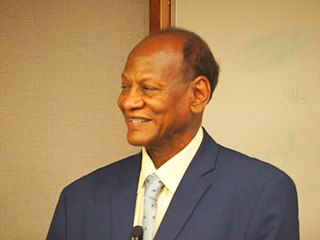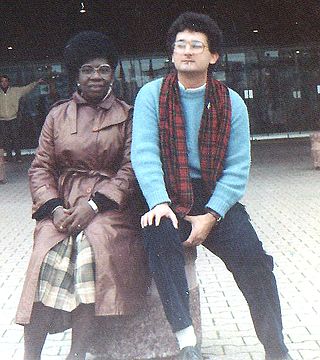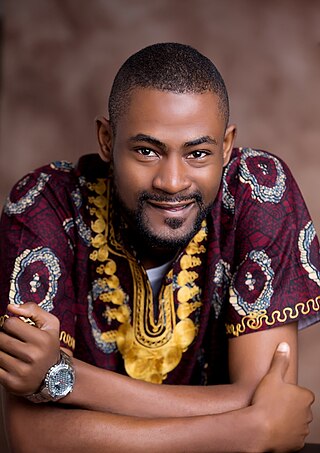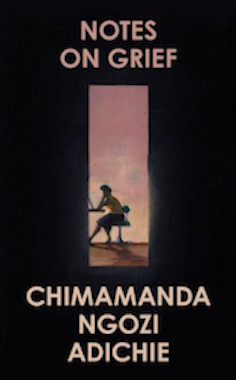
Florence Nwanzuruahu Nkiru Nwapa, was a Nigerian author who has been called the mother of modern African Literature. She was the forerunner to a generation of African women writers, and the first African woman novelist to be published in the English language in Britain. She achieved international recognition with her first novel Efuru, published in 1966 by Heinemann Educational Books. While never considering herself a feminist, she was best known for recreating life and traditions from an Igbo woman's viewpoint.

Bushra Elfadil, also spelled Bushra al-Fadil is a Sudanese writer. He has published several collections of short stories and novels in Arabic, with some of his stories translated into English, including anthologies of contemporary fiction from Sudan. In 2017, he was awarded the Caine Prize for African Writing.

Mabel Segun, NNOM is a Nigerian poet, playwright and writer of short stories and children's books. She has also been a teacher, broadcaster, and a sportswoman.
Sarah Ladipo Manyika FRSL is a British-Nigerian writer of novels, short stories and essays and an active member of the literary community, particularly supporting and amplifying young writers and female voices. She is the author of two well-received novels, In Dependence (2009) and Like A Mule Bringing Ice Cream To The Sun (2016), as well as the non-fiction collection Between Starshine and Clay: Conversations from the African Diaspora (2022), and her writing has appeared in publications including Granta, Transition, Guernica, and OZY, and previously served as founding Books Editor of OZY. Manyika's work also features in the 2019 anthology New Daughters of Africa, edited by Margaret Busby.

Petina Gappah is a Zimbabwean lawyer and writer. She writes in English, though she also draws on Shona, her first language. In 2016, she was named African Literary Person of the Year by Brittle Paper. In 2017 she had a DAAD Artist-in-Residence fellowship in Berlin.

Zukiswa Wanner is a South African journalist, novelist and editor born in Zambia and now based in Kenya. Since 2006, when she published her first book, her novels have been shortlisted for awards including the South African Literary Awards (SALA) and the Commonwealth Writers' Prize. In 2015, she won the K Sello Duiker Memorial Literary Award for London Cape Town Joburg (2014). In 2014, Wanner was named on the Africa39 list of 39 Sub-Saharan African writers aged under 40 with potential and talent to define trends in African literature.
Kwela Books is a South African publishing house founded in Cape Town in 1994 as a new imprint of NB Publishers.

Kọ́lá Túbọ̀sún is a Nigerian linguist, writer, translator, scholar, and cultural activist. His work and influence span the fields of education, language technology, literature, journalism, and linguistics. He is the recipient of the 2016 Premio Ostana "Special Prize" for Writings in the Mother Tongue for his work in language advocacy. He writes in Yoruba and English, and is currently the Africa editor of the Best Literary Translations anthology, published by Deep Vellum.
Cassava Republic Press is a steering African book publishing company established in Nigeria in 2006 and headed by Bibi Bakare-Yusuf, with a focus on affordability, the need to find and develop local talent, and to publish African writers too often celebrated only in Europe and America. Cassava Republic's stated mission is "to change the way we all think about African writing. (...) to build a new body of African writing that links writers across different times and spaces." The publishing house is considered to be "at the centre of a thriving literary scene" that has seen Nigerian writers in particular, as well as writers from elsewhere on the African continent, having considerable success both at home and internationally. ThisDay newspaper has stated of the publishing house that "it is credited with innovation. From driving down the cost of books to using digital media to drive sales, Cassava has invariably sought to redefine the African narrative."

Imachibundu Oluwadara Onuzo is a Nigerian novelist. Her first novel, The Spider King's Daughter, won a Betty Trask Award, was shortlisted for the Dylan Thomas Prize and the Commonwealth Book Prize, and was longlisted for the Desmond Elliott Prize and the Etisalat Prize for Literature.

Emmanuel Iduma is a Nigerian writer and art critic. He is the author of A Stranger's Pose (2018) and Farad (2012). In 2016, Farad was republished in North America as The Sound of Things to Come. He was awarded the inaugural Irving Sandler Award for New Voices in Art Criticism by the Association Internationale des Critiques d’Art, USA. He teaches in the MFA Art Writing Program at the School of Visual Arts, New York City.

Hadiza Isma El-Rufai is a Nigerian writer (novelist), and wife to the former governor of Kaduna State, Mallam Nasir El-Rufai. She was the founder of Yasmin El-rufai Foundation (YELF), a non-profit literary organization.
Khadija Abdalla Bajaber is a Mombasa-born poet and novelist with a degree in journalism whose manuscript was selected as the first winner of the Graywolf Press Africa Prize, awarded for a first novel manuscript by an African author primarily residing in Africa.
Ainehi Edoro is a Nigerian writer, critic and academic. She is the founder and publisher of the African literary blog Brittle Paper. She is currently an assistant professor of Global Black Literatures at the University of Wisconsin-Madison. Her areas of research include 21st-century fiction, literature in digital/social media, The Global Anglophone Novel, African Literature, Contemporary British Fiction, Novel Theory, Political Philosophy, and Digital Humanities.

Otosirieze Obi-Young is a Nigerian writer, editor, culture journalist and curator. He is editor of Open Country Mag. He was editor of Folio Nigeria, a then CNN affiliate, and former deputy editor of Brittle Paper. In 2019, he won the inaugural The Future Awards Africa Prize for Literature. He has been described as among the "top curators and editors from Africa."
Edwige-Renée Dro is a writer, translator and literary activist from Côte d'Ivoire. She is co-founder of the literature collective Abidjan Lit.
The Writivism Short Story Prize and Koffi Addo Prize for Creative Nonfiction are a pair of annual literary awards for work by emerging writers living in Africa. The Writivism Short Story Prize, for short fiction, was established in 2013. The Koffi Addo Prize for Creative Nonfiction was established in 2016.

Notes on Grief is a 2021 memoir written by the Nigerian author Chimamanda Ngozi Adichie. Presented in 30 short sections, Notes on Grief was written following the death of her father James Nwoye Adichie in June 2020, during the early days of the COVID-19 pandemic, and is expanded from an essay first published in The New Yorker. As The New York Times notes: "What she narrates is not only father loss, but the ways Mr. Adichie endures in having made of her a writer."

The Spider King's Daughter is a 2012 novel written by Nigerian writer Chibundu Onuzo. It was first published on March 1, 2012, by Faber and Faber.













